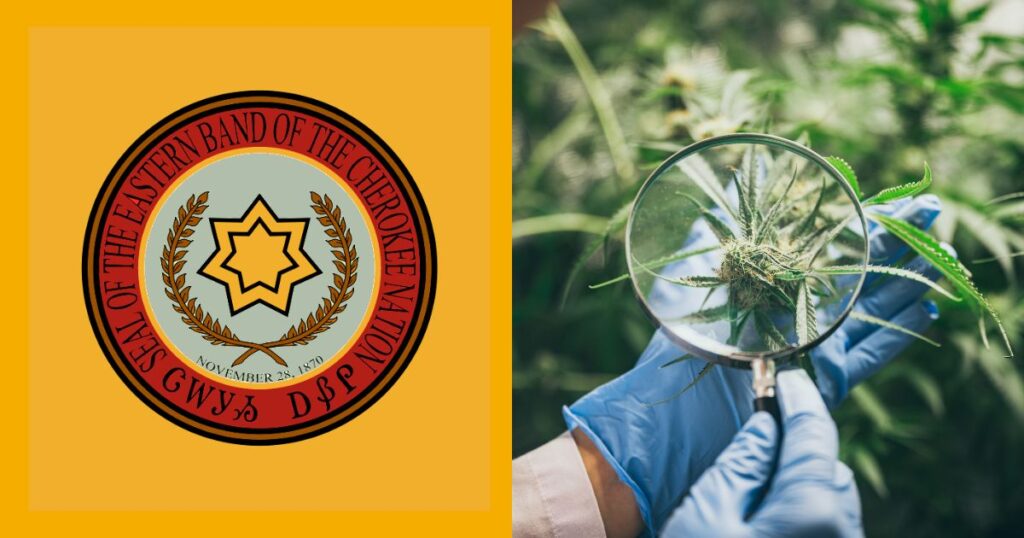The Eastern Band of Cherokee Indians (EBCI) Principal Chief Michell Hicks delivered a powerful response to Sen. Thom Tillis (R-N.C.) after the senator urged Attorney General Pam Bondi to investigate the tribe’s legal cannabis operations during a Senate Judiciary Committee hearing.
Senator Tillis Raises Concerns at Senate Hearing
During a Senate Judiciary Committee oversight hearing, Sen. Tillis presented Attorney General Bondi with what he characterized as concerning evidence about the EBCI’s cannabis business. Armed with poster boards showing aerial views of the tribe’s cannabis farm and marketing materials, Tillis made three specific allegations:
Marketing to Youth: Tillis expressed concern that the tribe’s fall-flavored cannabis products, including “pumpkin spice” varieties, mirror tobacco industry tactics of targeting young consumers. “This kind of feels to be like the way the tobacco industry got attacked for advertising to young people,” Tillis stated during the hearing.
Illegal Transportation Claims: The senator questioned how cannabis grown on one part of tribal land reaches the dispensary located in a non-contiguous area of the Qualla Boundary. Tillis sarcastically asked Bondi if she was familiar with “the science of teleportation,” suggesting the tribe must be illegally transporting cannabis across state boundaries.
App-Based Sales Concerns: Tillis highlighted the tribe’s mobile app, alleging it allows customers from states where cannabis remains illegal to order products online and pick them up after crossing state lines.
Attorney General Bondi assured Tillis that the Department of Justice would review these allegations, confirming that federal law prohibits transporting tribal cannabis off reservation land.
Chief Hicks Delivers Scathing Rebuttal
Principal Chief Michell Hicks didn’t mince words in his response, calling Tillis’s allegations both inaccurate and offensive. In a detailed statement released, Hicks accused the senator of advancing a “political agenda” rather than addressing legitimate legal concerns.
“Senator Tillis knows full well that the Eastern Band of Cherokee Indians operates squarely within the law,” Hicks declared. “Yet once again, he has chosen to ignore that truth to advance his own political agenda.”
The chief emphasized that the Eastern Band of Cherokee Indians cannabis operations are “fully compliant with federal and tribal law, guided by safety, transparency, and accountability.” He characterized Tillis’s attacks as being driven by “ego” rather than genuine legal concerns.
Perhaps most powerfully, Hicks turned Tillis’s own words against him. When the senator described the tribe as existing on an “island” in a “forgotten corner” of North Carolina, Hicks embraced the characterization with pride:
“He’s right about one thing: we are an island, and we are a stronghold of culture, integrity, and self-determination. From the heart of our ancestral homeland, we stand as a model of how sovereignty and economic development can coexist with respect for state and federal law, the environment, and our neighbors.”
The Legal Landscape of Tribal Cannabis
The EBCI’s cannabis operation exists within a complex legal framework that recognizes tribal sovereignty while maintaining federal oversight. As sovereign nations, federally recognized tribes can establish their own cannabis laws on their territories, even in states where marijuana remains illegal.
The Great Smoky Cannabis Co. dispensary opened on July 4, 2024, making it the first and only legal recreational cannabis dispensary in North Carolina. Located on the 57,000-acre Qualla Boundary about 50 miles west of Asheville, the operation has drawn customers from across the region.
However, federal law creates clear boundaries: while tribes can sell cannabis on their sovereign lands, customers cannot legally transport these products off tribal territory into states where cannabis remains prohibited. This creates a legal gray area that concerns lawmakers like Tillis, who worry about enforcement challenges.
Economic Impact and Community Benefits That Cannabis Brings to Eastern Band of Cherokee Indians
The cannabis industry represents a significant economic opportunity for the EBCI, building on the tribe’s successful gaming and tourism enterprises. The dispensary’s marketing describes it as “one of the country’s largest,” attracting customers from multiple states despite transportation restrictions.
For the Eastern Band of Cherokee Indians, cannabis commerce is more than just revenue—it’s an expression of sovereignty and economic self-determination. The tribe has emphasized safety protocols, regulatory compliance, and responsible business practices in developing their cannabis program.
The operation includes comprehensive age verification systems, security measures, and educational components designed to promote responsible use while preventing youth access—directly contradicting Tillis’s allegations about targeting minors.
This controversy occurs against the backdrop of evolving national cannabis policy. Sen. Tillis himself has previously expressed support for federal cannabis regulation, calling for a comprehensive framework that would “let states opt in” to legalization while establishing federal excise taxes and safety standards.
During the hearing, Tillis reiterated his position that he’s “not an anti-cannabis person” but believes current patchwork regulations create enforcement challenges and public safety concerns.
The senator has advocated for eliminating flavored cannabis products, banning Chinese imports, and creating standardized regulations similar to those governing alcohol and tobacco.
However, his focus on the Cherokee operation suggests tensions about how tribal sovereignty intersects with federal drug policy.
Moving Forward: Sovereignty vs. Federal Oversight
The Department of Justice’s pending review will likely examine whether the EBCI’s operations comply with existing federal guidelines for tribal cannabis programs.
Previous DOJ guidance has generally respected tribal sovereignty in cannabis matters while maintaining that tribal cannabis cannot cross into non-legal jurisdictions.
Chief Hicks made clear that the tribe will not be intimidated by political pressure, stating: “We will not be drawn into petty politics or ego-driven theatrics. Our focus remains on governing responsibly, protecting our heritage, and strengthening the future of our people and our partners across North Carolina and Indian Country.”
A Test Case for Indigenous Rights
This dispute is a larger test of tribal sovereignty in the modern era. As more tribes explore cannabis commerce as an economic development tool, conflicts with state and federal officials are likely to increase.
The EBCI’s response signals that tribal nations are prepared to defend their sovereignty rights against political pressure, even when it comes from powerful senators. Chief Hicks’s statement that the tribe will “continue to lead in defending the truth of our people and the sovereignty of all Tribal Nations” suggests this controversy extends beyond North Carolina politics.
The Path Ahead
As the likely DOJ review proceeds, the Cherokee cannabis case could establish important precedents for how federal agencies handle tribal cannabis operations. The outcome may influence other tribes considering similar ventures and shape the conversation about cannabis federalism.
For now, the Great Smoky Cannabis Co. continues operating under tribal law, serving customers from across the region while maintaining strict compliance with federal guidelines regarding transportation restrictions.
The heated exchange between Sen. Tillis and Chief Hicks reflects deeper tensions about sovereignty, economic development, and the evolving landscape of cannabis policy.
As both sides dig in for what could be a prolonged legal and political battle, the stakes extend far beyond North Carolina’s mountains—potentially reshaping how tribal nations exercise their sovereignty rights in the 21st century.
The Cherokee Nation’s cannabis program stands as both an economic venture and a powerful statement about indigenous self-determination.
Whatever the DOJ’s findings, this controversy has already highlighted the complex intersection of tribal sovereignty, federal law, and state politics in America’s rapidly evolving cannabis landscape.
















